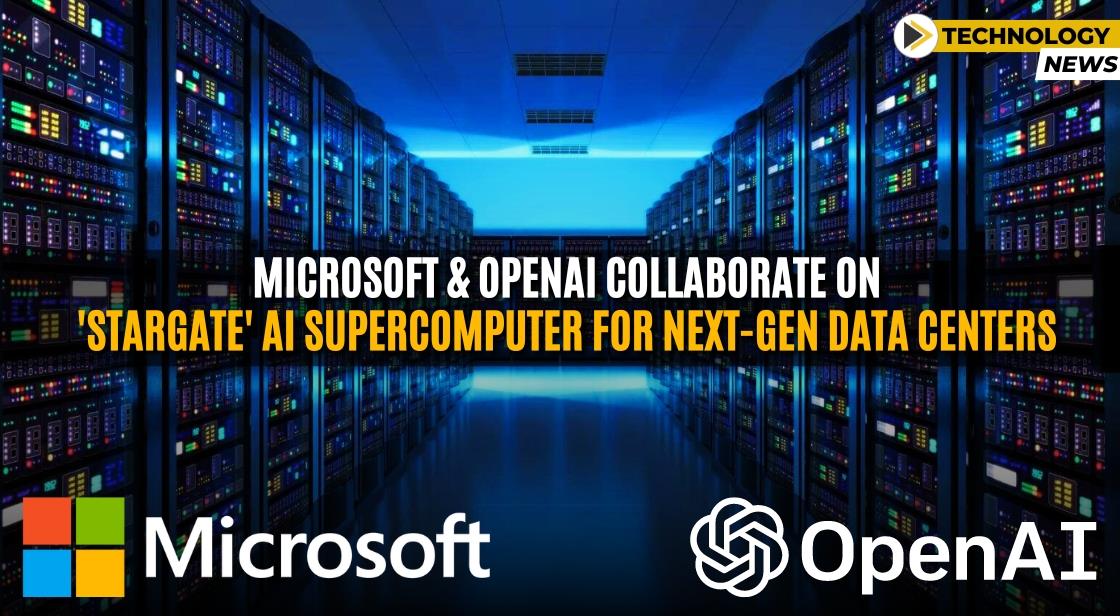Microsoft and OpenAI Collaborate on 'Stargate' AI Supercomputer for Next-Gen Data Centers

News Synopsis
Tech giants Microsoft and OpenAI are making a monumental leap forward in the realm of artificial intelligence. The two companies are reportedly collaborating on a groundbreaking project: a massive data center initiative estimated to cost a staggering $100 billion. This ambitious venture, codenamed "Stargate," is slated for completion in 2028 and will house a cutting-edge AI supercomputer designed to push the boundaries of artificial intelligence capabilities.
Stargate: A Supercomputer for the Next Generation of AI
The driving force behind this project is the ever-evolving field of generative AI. As AI models become more sophisticated, handling increasingly complex tasks, traditional data centers struggle to keep pace. Stargate, envisioned as the most powerful supercomputer in the United States, aims to address this critical need.
According to The Information, Microsoft is expected to shoulder the financial burden of this colossal project, which could eclipse the cost of current large data centers by a factor of 100. This ambitious endeavor involves constructing Stargate as the centerpiece of a series of supercomputer installations planned for the next six years.
Specific details regarding the technical specifications of Stargate remain undisclosed, but its immense scale suggests unparalleled processing power, potentially unlocking new frontiers in AI research and development.
The exact sources of the $100 billion cost estimate haven't been revealed, but The Information cites an individual familiar with discussions involving OpenAI CEO Sam Altman and another source privy to Microsoft's initial cost projections.
OpenAI's GPT Store Flourishes: Monetization for GPT Builders
While Microsoft and OpenAI focus on the colossal Stargate project, OpenAI, the company behind the revolutionary ChatGPT language model, has been making significant strides with its GPT (Generative Pre-trained Transformer) models. Earlier in 2024, OpenAI launched the GPT Store, a first-of-its-kind marketplace modeled after app stores like Google Play Store or Apple App Store, but specifically designed for chatbots. The GPT Store allows developers to showcase their custom-built GPT models, providing users with a diverse range of chatbot options.
OpenAI's initial vision for the GPT Store involved compensating GPT builders for their creations, and this vision is now coming to fruition. In a recent announcement on X (formerly Twitter), the parent company of ChatGPT, they revealed the piloting of a new payment model designed to reward GPT builders.
This groundbreaking initiative involves a select group of GPT builders in the United States who will participate in a usage-based earnings system. The system directly ties a builder's earnings to the usage metrics of their models, incentivizing the creation of high-quality, user-friendly chatbots.
The introduction of a payment model for GPT builders represents a significant development in the AI landscape. This innovative approach empowers creators to monetize their work, fostering a thriving ecosystem of GPT development. The more users interact with and utilize these chatbots, the greater the potential earnings for GPT builders.
This not only motivates continued innovation but also paves the way for a future where AI-powered chatbots become an integral part of our daily lives.
Conclusion:
The collaboration between Microsoft and OpenAI represents a monumental leap forward in AI infrastructure and development. With the creation of the Stargate AI supercomputer and advancements in GPT models, the stage is set for a new era of innovation in artificial intelligence.
You May Like









